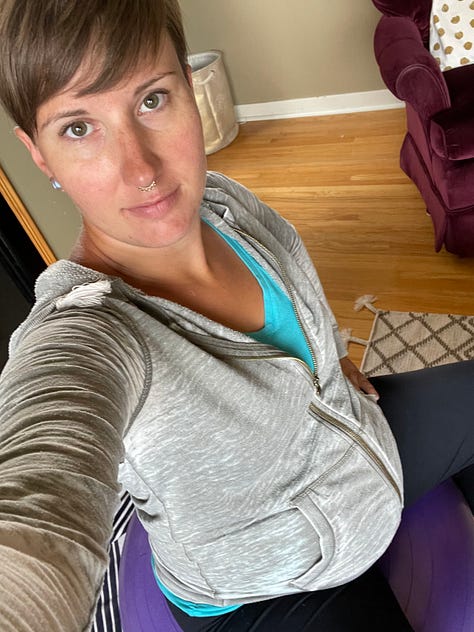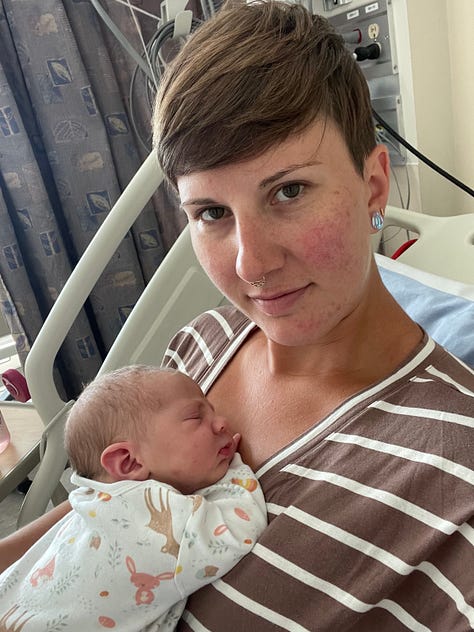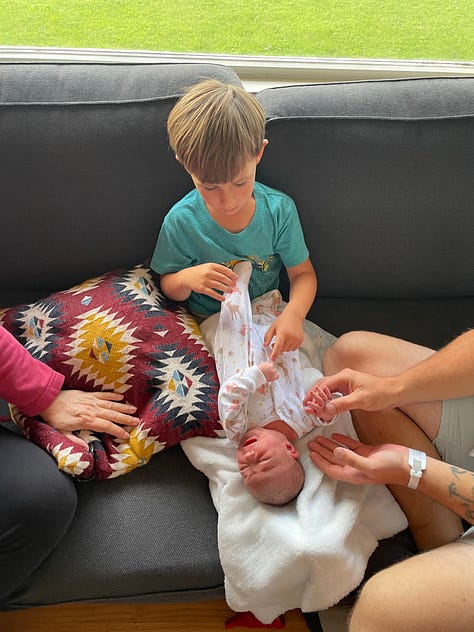Hello friend,
I very clearly remember the day that Sage was born. Although she is my second child, she was my first water breaking, my first labour, my first vaginal birth. I remember spending two weeks doing different poses, curb walking, and other strategies to turn the pre-labour contractions into early labour contractions. Since Declan was a belly birth, there was a bit more pressure put on me by the medical system to start labour before 41 weeks without the use of interventions. I’m so grateful for the support of our doula, as she guided me toward the VBAC I so earnestly desired.
On August 2nd, at 11 p.m., I can still recall my shock as I was laying inverted in bed and my water broke. I remained stock-still as amniotic fluid poured onto the sheets, as if I could stop the rush if I simply didn’t move. After moving to the bathtub, Jason called the doula, and we discussed what my options were. I chose to stay at home, rest while I could, and wait for contractions. The medical professionals would likely tell me the same thing after checking me over—why add an unnecessary trip to be told what I already knew?
I slept several hours before waking around 3am; still no contractions. I used my breast pump intermittently to try and jumpstart them. I tried curb walking in the morning, once Jason and Declan woke up, but the water that was still leaking made it very uncomfortable. Around 11, I was getting a little panicky. I didn’t want to have any interventions, and I knew that 24 hours after water breaking, the doctors want to get things going. So, I used the breast pump again, which finally jump started some intense contractions that slowed down into manageable early labour.
I stayed at home for several hours; our doula arrived to support us and let me know when it would be ideal to go to the hospital. It wasn’t a long drive, but any interruptions in labour have the potential to slow down or stall contractions completely—we wanted to make sure we hit the sweet spot of labouring at home as long as possible, but not too long as to have a car birth. We ended up arriving around 2:30, and thankfully, with the help of my hypno-birthing soundtrack, my labour continued on.
The nurse who triaged me was not pleased that I didn’t come when my water broke. I remained confident in my choice, and we all managed to agree that things were going smoothly regardless. I got a room and was able to labour in water for a while—but since it was in a bathtub, not a pool, I didn’t feel like I was able to be active in my contractions while laying down, and it was very difficult to find a comfortable position on my knees. When I started grunting, the nurse got Jason and my doula to bring me back to the room because I wasn’t allowed to birth in the bathtub. I was quickly moving toward transition at that point.
My memory becomes a bit blurry from there. I remember having the bed contorted into a shape that would allow me to remain comfortable, with my knees on the lowered end and my upper body hanging over the raised end. I remember the doctor’s shift switching several hours before Sage was born, and a new one coming on. The first doctor, who I did not meet beforehand, had been very chill and happy to let me do my thing while checking in occasionally; the second doctor, who I had met at my clinic once, was shocked that I didn’t have a monitor strapped to my belly to keep Sage’s heartbeat in check. However, as Sage was descending, they had to keep moving the monitor lower, which was frustrating to me as they were in the way while I was rocking to move through the pain and move Sage through the birth canal.
I think, however, what I most remember about this point in labour is how quickly the waves started to overtake me. Even in between contractions, my back was in so much pain I could barely move. There was no reprieve. I began to lose confidence that I could catch my breath as I felt like I was being pulled under. As I felt each contraction coming, I cried out “I CAN’T DO THIS!” And my team would say, “Yes, sweetheart. Yes, you can! You’re doing it!” To which I would reply, “NO, I’M NOT!” I would start to panic, and my low moans would get higher and more freaked out; Jason reminded me to get low again, pulling me back into my body. This happened for every contraction for who knows how long. Each time I cried out, my team would rally behind me, reminding me that we were getting closer and closer to meeting our baby, and I would find some resolve to continue riding the waves despite my delirious state.
And I did, indeed, meet that baby.



What strikes me about my birth story is how, in the moment, I didn’t think I was coping. I was disappointed that I wasn’t able to get into my primal state, tune into my body, and embrace the contractions without fighting them. I had a vision of how my labour would go and crying out “I CAN’T DO IT! I’M NOT DOING THIS!” wasn’t it. As I processed in the days that followed, however, I realized, wait, that WAS coping. When the pain became too great for me to bear on my own, I cried out to my support people, and they held so much space for me, reminding me that I was indeed doing the thing and it was leading to something beautiful. They held hope for me that, even though the pain was unimaginable and I couldn’t see beyond the present moment, I could handle it and there was a reason it was happening.
I’ve been coming back to this story a lot as I have been journeying through some really big transitions. Each time, I’m reminded that even when the waves feel like they are about to crash over me, I am not alone; I have these beautiful supports around me, and it’s okay if coping means crying out to them, “I can’t do this!” It’s okay to feel fear and anxiety, allowing it to settle into my body, moving through it, and doing the thing anyway. But I need to be brave enough to speak it out loud to the people I trust. Often, when I feel alone, it’s really just because I’m unwilling to invite other people into my struggle—I tell myself a lot of stories about being a burden, or that I’m too much, or that my pain doesn’t really matter when I compare it to what others are experiencing.
Several weeks ago, in a mama’s circle that I host on Tuesday mornings, I shared that I was feeling really defeated, being very hard on myself, and wondering if what I’m doing even matters. In that moment, I felt so raw, but also so safe with these other women I’d been building a relationship with over the last several months, and one mama looked at me and said how much it surprised her when I said things like that. She said hearing me talk about the self-doubt I feel is something she wouldn’t expect because she sees me as this strong, confident, and kind person, and she told me how much she values the opportunity I’ve created to come together and talk about real life with other moms. I never would have received that support and heartfelt encouragement had I pretended that I was fine, had I not shared my current version of “I can’t do it! I’m not doing this!”
As I come up to a year in ministry, I’m recognizing now more than ever how important reciprocity is—that I don’t try to constantly give my times and gifts to others, but also receive from the people I share space with, even children. If I hold myself as being the one who meets other’s needs and not someone who also has needs, if I choose not to receive the gifts being offered to me, it unintentionally creates the story that I am above others. Not only does this lead to burnout, but it also brings a sense of disconnection from the very people I hope to build relationships with. Adopting a posture of reciprocity tells folks that both their gifts and their needs are honoured at this table, and that they are safe to embrace whatever position they’re in.
Through this journey, I’ve had to learn to stop saying, “You didn’t have to do that,” or “Oh, don’t worry about me. I’m okay,” or “Someone else needs this more than me,” and start saying things like “Thank you. I really appreciate that you thought of me,” or “I really needed that encouragement today,” or “I hope that offering my presence and authenticity in return for your gift is enough.” I’ve had to reach out with all the courage I can muster to my safe people when my internal stories tell me “I can’t do this! I’m a burden! Everyone is disappointed in me!” I’ve had to remind myself that I can’t show anyone the path if I’m not willing to go there first—if I don’t honour my fully human needs and receive support, how can I journey with others and offer that in a mutually dignifying way?
Perhaps, more than anything, I’ve had to rebuild new beliefs that tell me it’s possible that I’m worthy of care and validation, that others are offering to me because it brings them joy, and that their support is actually an expression of the connection we share.
Some of the most painful experiences we’ll have in life come to us through relationship, whether it leads to meeting your beautiful new baby or to fractured relationships and disconnection. And while coping and healing and growth do have a solitary aspects to them, they also have communal aspects that aren’t celebrated in the individualistic culture we currently live in. We feel ashamed for asking for or needing support from others; we think others are judging us or looking down on us for being a human; and we derive our worth from being as little a burden to our friends and family as possible while simultaneously believing we should be the ones offering our help.
My friends, may we learn that our presence and our authenticity and our vulnerability will be embraced by our safe people. May we be brave and honest when life feels overwhelming and we could use a hand up. May we know deeply that we are ALL humans with needs, and these needs are not too much. May we embrace the ebb and flow that reciprocity entails, trusting that connection and trust and love is being built in the process. May we call out “I can’t do this!” when we need the love of our support team to surround us and remind us that we can and, indeed, we are doing the thing.
When was the last time you called out to your safe people for support? How did they respond?
When has pain led to something challenging? When has it led to something beautiful?
How will you embrace the ebb and flow of reciprocity in your life?









I needed more support during my second birth, too, and it was a good exercise in learning to accept more support afterward as well. I have certainly needed much more of it since then. It really does get a little easier when you can be kind to yourself about it.